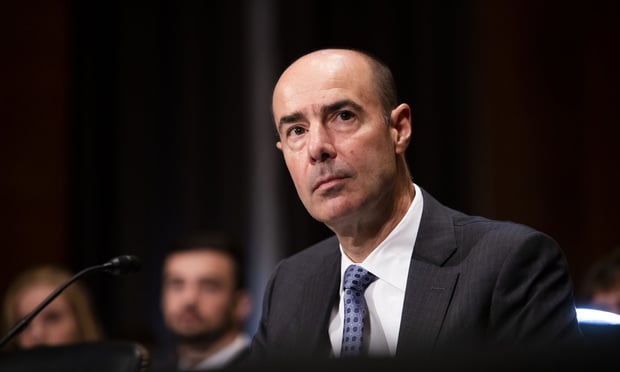Is 'Self-Censorship' Keeping Big Law Conservatives on the Sidelines?
That's what longtime Gibson Dunn partner and current U.S. Labor Secretary Eugene Scalia told a meeting of the Federalist Society last week. Not everyone agrees.
November 19, 2019 at 04:06 PM
6 minute read
 Eugene Scalia testifies before the Senate Health, Education, Labor and Pensions Committee during his confirmation hearing to become Secretary of the U.S. Labor Department on Sept. 19. Photo: Diego M. Radzinschi/ALM
Eugene Scalia testifies before the Senate Health, Education, Labor and Pensions Committee during his confirmation hearing to become Secretary of the U.S. Labor Department on Sept. 19. Photo: Diego M. Radzinschi/ALM
Not one but two former Big Law partners in President Donald Trump's cabinet bemoaned the assertiveness of the left in pushing its political agenda in remarks before the Federalist Society last week.
But unlike Attorney General William Barr's widely reported comments condemning the "resistance" for the "systematic shredding of norms and the undermining of the rule of law," Secretary of Labor Eugene Scalia's remarks about ideological self-censorship within big law firms went largely under the radar.
The former Gibson, Dunn & Crutcher partner said he was alarmed about a climate where several dozen law firms will put their names on amicus briefs aimed at defending the Deferred Action for Childhood Arrivals program and asserting that LGBT workers are protected by federal civil rights law, but none are willing to advance the opposite position.
"Anyone familiar with in the practice of law knows that these lopsided representations have nothing to do with the legal merits of the two cases or with the absence of lawyers at large firms who would be interested in representing a client on the other side," Scalia argued, noting that there were likely Big Law attorneys in the room Friday who would have been eager to file briefs defending the U.S. Department of Justice's position on DACA or the employers and the DOJ's interpretation of Title VII.
"One factor preventing that in these and other cases is self-censorship. Our elite law firms are hesitant to get involved in cases that might generate criticism from the left of center or that might conflict with views that other lawyers in the firm hold personally," he continued. "Secondly, firms fear repercussions from certain well-heeled corporate clients if they take positions disfavored by progressives. And sadly there's reason for that concern."
Scalia, who is the son of late U.S. Supreme Court Justice Antonin Scalia and whose former Gibson Dunn partner Ted Olson argued on behalf of DACA recipients before the high court earlier this month, said that firms should pride themselves for representing controversial positions on all sides of the political spectrum, "as they have in the past," and should push back against clients who seek to muscle because of another client represented by the firm.
"It can't be assumed that corporate executives know or will honor or defend the values of the legal profession," he said.
The turning point for Scalia was when former U.S. solicitor Paul Clement left King & Spalding in 2011 after the firm backed out of defending the Defense of Marriage Act, which stood in the way of same-sex marriage. Clement left for boutique Bancroft, but he's now a partner at Kirkland & Ellis, which acquired Bancroft in 2016.
And he warned of a slippery slope for firms that kowtow to the political stances of their major clients.
"Today a corporation accused of environmental crimes objects to a lawyer at its outside law firm filing a brief in support of the unborn," Scalia said. "Tomorrow, why can't someone schooled in today's 'cancel culture' use the same logic to attack the firm for defending that company's environmental depredations."
Scalia avoided the term "pro bono" in his remarks Friday. But all the same, he elided the distinction between cases on hot-button political issues like immigration or LGBT rights and traditional pro bono work.
The latter often takes on a progressive hue simply because, more often than not, it's the marginalized and vulnerable who need free representation. The status quo doesn't lack for counsel.
"When you see attorneys coming in from large law firms, it's usually and it's best when they're coming on board on behalf of people who don't have powerful lawyers—the powerless, the little guy," said Philadelphia attorney Steve Harvey, who won a landmark case challenging the teaching of intelligent design as a pro bono matter while a partner at Pepper Hamilton.
He pointed to Dechert's recent work challenging a Pennsylvania ballot initiative over a package of victims' rights initiatives known as Marsy's Law. Supporters had a powerful media campaign in which Frasier star Kelsey Grammer blanketed the state's airwaves. It fell to Dechert and the American Civil Liberties Union to make the case that the bill was poorly drafted and threatened constitutional rights.
"If there are attorneys in big law firms that have cases or positions that meet the criteria for pro bono representation recognized in the profession and by their law firms, then they should work on those cases," Harvey said, adding that if anything, he suspected that financial pressure, not political pressure, stood in the way.
William Lee, former co-chairman of Wilmer Cutler Pickering Hale and Dorr, also emphasized that Big Law attorneys often have substantial autonomy when it comes to pursuing causes.
"I think those comments paint with too broad a brush. Pro bono efforts at law firms are in large part the result of the efforts and interests of individual partners. That interest and effort spans the political spectrum," he said. "That's the way it should be."
Lee said that in his 12 years at the helm of the firm, he could not think of one instance where a corporate client intervened or suggested the firm take a position on a social or political issue. The closest example was the assistant secretary of the U.S. army, responding to the firm's representation of Guantanamo Bay detainees, suggested that clients should take their business elsewhere.
"We received an outpouring of client support," he said.
For Harvey, if anything, the pressure is in the opposite direction.
"Law firms are inclined to take cases that would be splashy but probably wouldn't offend too many of your clients: think Intelligent Design, think LGBT equality," he said. "The bigger factor is all the cases that you never take on because it might upset the clients."
Take climate change and other environmental cases connected to the fossil fuel industry. While Scalia's former firm Gibson Dunn has defended Chevron in some of the most high-profile climate change to date, it's hard to find major law firms on the other side of that fight.
"Big law won't take that on," Harvey said. "It's lonely."
Read More
Labor Appointee Eugene Scalia Earned $6.2M as Gibson Dunn Partner
Want To Do Conservative Pro Bono? Good Luck.
Did Eugene Scalia Disavow His Father's Ruling on Homosexuality?
This content has been archived. It is available through our partners, LexisNexis® and Bloomberg Law.
To view this content, please continue to their sites.
Not a Lexis Subscriber?
Subscribe Now
Not a Bloomberg Law Subscriber?
Subscribe Now
NOT FOR REPRINT
© 2025 ALM Global, LLC, All Rights Reserved. Request academic re-use from www.copyright.com. All other uses, submit a request to [email protected]. For more information visit Asset & Logo Licensing.
You Might Like
View All
Paul Hastings, Recruiting From Davis Polk, Adds Capital Markets Attorney
3 minute read
Kirkland Is Entering a New Market. Will Its Rates Get a Warm Welcome?
5 minute read

Goodwin Procter Relocates to Renewable-Powered Office in San Francisco’s Financial District
Trending Stories
- 1Trump Signs Executive Order Creating Strategic Bitcoin Reserve
- 2St. Jude Labs Sued for $14.3M for Allegedly Falling Short of Purchase Expectations
- 3'Ridiculously Busy': Several Law Firms Position Themselves as Go-To Experts on Trump’s Executive Orders
- 4States Reach New $7.4B Opioid Deal With Purdue After SCOTUS Ruling
- 5$975,000 Settlement Reached After Fall on Sidewalk
Who Got The Work
J. Brugh Lower of Gibbons has entered an appearance for industrial equipment supplier Devco Corporation in a pending trademark infringement lawsuit. The suit, accusing the defendant of selling knock-off Graco products, was filed Dec. 18 in New Jersey District Court by Rivkin Radler on behalf of Graco Inc. and Graco Minnesota. The case, assigned to U.S. District Judge Zahid N. Quraishi, is 3:24-cv-11294, Graco Inc. et al v. Devco Corporation.
Who Got The Work
Rebecca Maller-Stein and Kent A. Yalowitz of Arnold & Porter Kaye Scholer have entered their appearances for Hanaco Venture Capital and its executives, Lior Prosor and David Frankel, in a pending securities lawsuit. The action, filed on Dec. 24 in New York Southern District Court by Zell, Aron & Co. on behalf of Goldeneye Advisors, accuses the defendants of negligently and fraudulently managing the plaintiff's $1 million investment. The case, assigned to U.S. District Judge Vernon S. Broderick, is 1:24-cv-09918, Goldeneye Advisors, LLC v. Hanaco Venture Capital, Ltd. et al.
Who Got The Work
Attorneys from A&O Shearman has stepped in as defense counsel for Toronto-Dominion Bank and other defendants in a pending securities class action. The suit, filed Dec. 11 in New York Southern District Court by Bleichmar Fonti & Auld, accuses the defendants of concealing the bank's 'pervasive' deficiencies in regards to its compliance with the Bank Secrecy Act and the quality of its anti-money laundering controls. The case, assigned to U.S. District Judge Arun Subramanian, is 1:24-cv-09445, Gonzalez v. The Toronto-Dominion Bank et al.
Who Got The Work
Crown Castle International, a Pennsylvania company providing shared communications infrastructure, has turned to Luke D. Wolf of Gordon Rees Scully Mansukhani to fend off a pending breach-of-contract lawsuit. The court action, filed Nov. 25 in Michigan Eastern District Court by Hooper Hathaway PC on behalf of The Town Residences LLC, accuses Crown Castle of failing to transfer approximately $30,000 in utility payments from T-Mobile in breach of a roof-top lease and assignment agreement. The case, assigned to U.S. District Judge Susan K. Declercq, is 2:24-cv-13131, The Town Residences LLC v. T-Mobile US, Inc. et al.
Who Got The Work
Wilfred P. Coronato and Daniel M. Schwartz of McCarter & English have stepped in as defense counsel to Electrolux Home Products Inc. in a pending product liability lawsuit. The court action, filed Nov. 26 in New York Eastern District Court by Poulos Lopiccolo PC and Nagel Rice LLP on behalf of David Stern, alleges that the defendant's refrigerators’ drawers and shelving repeatedly break and fall apart within months after purchase. The case, assigned to U.S. District Judge Joan M. Azrack, is 2:24-cv-08204, Stern v. Electrolux Home Products, Inc.
Featured Firms
Law Offices of Gary Martin Hays & Associates, P.C.
(470) 294-1674
Law Offices of Mark E. Salomone
(857) 444-6468
Smith & Hassler
(713) 739-1250










